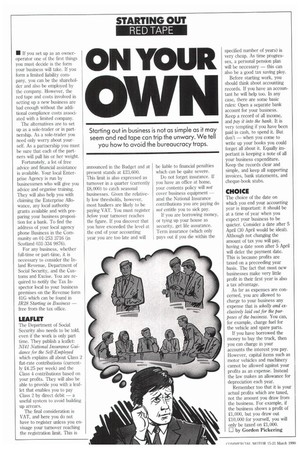ON YOUR
Page 36

If you've noticed an error in this article please click here to report it so we can fix it.
Starting out in business is not as simple as it may seem and red tape can trip the unwary. We tell you how to avoid the bureaucracy traps.
MI If you set up as an owneroperator one of the first things you must decide is the form your business will take. If you form a limited liability company, you can be the shareholder and also be employed by the company. However, the red tape and costs involved in setting up a new business are bad enough without the additional compliance costs associated with a limited company.
The alternatives are to set up as a sole-trader or in partnership. As a sole-trader you need only worry about yourself. As a partnership you must be sure that each of the partners will pull his or her weight.
Fortunately, a lot of free advice and financial assistance is available. Your local Enterprise Agency is run by businessmen who will give you advice and organise training. They will also help you with claiming the Enterprise Allowance, any local authority grants available and with preparing your business proposition for a bank. To find the address of your local agency phone Business in the Community on 01-253 3716 (in Scotland 031-334 9876).
For any business, whether full-time or part-time, it is necessary to consider the Inland Revenue, Department of Social Security, and the Customs and Excise. You are required to notify the Tax Inspector local to your business premises on the Revenue form 41G which can be found in 1R28 Starting in Business — free from the tax office.
LEAFLET
The Department of Social Security also needs to be told, even if the work is only part time. They publish a leaflet: N141 National Insurance Guidance for the Self-Employed which explains all about Class 2 flat-rate contributions (currently 24.25 per week) and the Class 4 contributions based on your profits. They will also be able to provide you with a leaflet that enables you to pay Class 2 by direct debit — a useful system to avoid building up arrears.
The final consideration is VAT, and here you do not have to register unless you envisage your turnover reaching the registration limit. This is
announced in the Budget and at present stands at 223,600. This limit is also expressed as turnover in a quarter (currently 28,000) to catch seasonal businesses. Given the relatively low thresholds, however, most hauliers are likely to be paying VAT. You must register before your turnover reaches the figure. If you discover that you have exceeded the level at the end of your accounting year you are too late and will be liable to financial penalties which can be quite severe.
Do not forget insurance. If you have an office at home, your contents policy will not cover business equipment — amd the National Insurance contributions you are paying do not entitle you to sick pay.
If you are borrowing money, or tying up your house as security, get life assurance. Term insurance (which only pays out if you die within the specified number of years) is very cheap. As time progresses, a personal pension plan will be necessary — this can also be a good tax saving ploy.
Before starting work, you should think about accounting records. If you have an accountant he will help too. In any case, there are some basic rules: Open a separate bank account for your business. Keep a record of all income, and pay it into the bank. It is very tempting if you have been paid in cash, to spend it. But don't — when you come to write up your books you could forget all about it. Equally important is keeping a note of all your business expenditure. Keep the records clear and simple, and keep all supporting invoices, bank statements, and cheque-book stubs.
CHOICE
The choice of the date on which you end your accounting year is important: it should be at a time of year when you expect your business to be quieter. Consider a date after 5 April (30 April would be ideal). Although not changing the amount of tax you will pay, having a date soon after 5 April will defer the payment date. This is because profits are taxed on a preceeding year basis. The fact that most new businesses make very little profit in their first year is also a tax advantage.
As far as expenses are concerned, you are allowed to charge to your business any expense that is wholly and exclusively laid out for the purposes of the business. You can, for example, charge fuel for the vehicle and spare parts.
If you have borrowed the money to buy the truck, then you can charge in your accounts the interest you pay. However, capital items such as motor vehicles and machinery cannot be allowed against your profits as an expense. Instead the law makes an allowance for depreciation each year.
Remember too that it is your actual profits which are taxed, not the amount you draw from the business. For example, if the business shows a profit of 21,000. but you draw out 210,000 for yourself, you will only be taxed on 21,000. 0 by Gordon Pickering




















































































































































